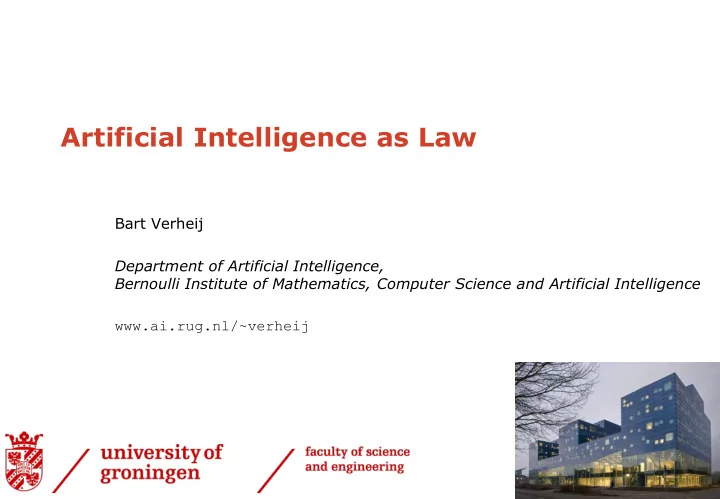

Artificial Intelligence as Law Bart Verheij Department of Artificial Intelligence, Bernoulli Institute of Mathematics, Computer Science and Artificial Intelligence www.ai.rug.nl/~verheij
Guillotine, Nieuwmarkt, Amsterdam, 1812 (Rijksmuseum RP-P-OB-87.033)
TV series Futurama, judge 723 (futurama.fandom.com/wiki/Judge_723)
LOI n° 2019-222 du 23 mars 2019 de programmation 2018-2022 et de réforme pour la justice (1) - Article 33 Les données d'identité des magistrats et des membres du greffe ne peuvent faire l'objet d'une réutilisation ayant pour objet ou pour effet d'évaluer, d'analyser, de comparer ou de prédire leurs pratiques professionnelles réelles ou supposées. The identity data of magistrates and members of the registry cannot be reused with the purpose or effect of evaluating, analyzing, comparing or predicting their actual or alleged professional practices. March 2019
May 11, 2019
NRC Handelsblad June 15, 2019
Dutch AI Manifesto, bnvki.org
Network Centre Excellence across all of AI. Centre Hub Centre For all of Europe. Centre With a Human-Centred Focus. Centre I am a member of the CLAIRE Research Network.
AI&Law has worked on the design of socially aware explainable responsible AI for decades already
AI as Law
CodeX Techindex (Stanford)
Legal tech exists, is it AI?
AI & Law is hard
Nederland ontwapent The Netherlands disarm
Hurdles 1. Legal reasoning is rule-guided, rather than rule- governed. 2. Legal terms are open textured. 3. Legal questions can have more than one answer, but a reasonable and timely answer must be given. 4. The answers to legal questions can change over time. Rissland 1988 on Gardner 1987 Harvard Journal of Law and Technology
The subsumption model Facts (given) Legal consequence(s) Rules (given) Montesquieu (1689-1755): The judge as ‘bouche de la loi’
The theory construction model
The theory construction model Legal Legal consequences consequences (initial version) (final version) Facts Facts (initial version) (final version) Evidence Evidence (initial version) (final version)
AI as Law
Artificial Intelligence AI as mathematics AI as technology AI as psychology AI as sociology AI as law
Artificial Intelligence AI as mathematics Logic Probability theory AI as technology Expert systems Machine learning AI as psychology Cognitive modeling Cognitive computing AI as sociology Multi-agent systems Autonomous robots AI as law ...
Toulmin on logic Logic as mathematics Logic as technology Logic as psychology Logic as sociology Logic as law
Law Law as mathematics Rule following Stare decisis Law as technology Civil law Common law Law as psychology Judicial reasoning Judicial discretion Law as sociology Critical discussion Societal regulation Law as law Rule of law Justice
Artificial Intelligence AI as mathematics Logic Probability theory AI as technology Expert systems Machine learning AI as psychology Cognitive modeling Cognitive computing AI as sociology Multi-agent systems Autonomous robots AI as law Hybrid critical discussion systems
Topics in AI Reasoning Knowledge Learning Language
Reasoning Argumentation Defeasibility Inconsistency, incompleteness, uncertainty
John is owner Mary is owner Mary is original owner John is the buyer John was not bona fide Pros John bought the bike for €20 Cons
Abstract argumentation semantics (1995) Stable extension Grounded extension Preferred extension Dung 1995 Complete extension
Abstract argumentation semantics (1996) Stable extension Semi-stable extension Stage extension Grounded extension Preferred extension Dung 1995 Verheij 1996 Complete extension
Argumentation semantics (2003) Stage Stable Stable Semi-stable Preferred DefLog Verheij 2003
Abstract argumentation (Dung 1995) Dung’s abstract arguments have internal structure representing support Abstract version:
Case models
Knowledge Argumentation schemes Norms Ontologies
2015
Scenario schemes Bex 2009 dissertation
Learning Statistical analysis Open data Neural networks
Netherlands Criminal Courts Prediction Machine Predict
Netherlands Criminal Courts Prediction Machine Predict Prediction: The suspect is guilty as charged
Netherlands Criminal Courts Prediction Machine Predict Prediction: The suspect is guilty as charged CBS: Central Bureau of Statistics in the Netherlands
Netherlands Criminal Courts Prediction Machine Predict Prediction: The suspect is guilty as charged CBS: Central Bureau of Statistics in the Netherlands
Judicial prediction US supreme court prediction Prediction method Correct Majority outcome (= always affirm) 60% Majority outcome in past 10 years 67% AI model (Katz, Bommarito, Blackman 2017) 70% European Court of Human Rights Prediction method Correct Random guess (prepared dataset) 50% AI model (Aletras et al 2016) 79% AI model (Aletras et al 2016) only using circumstances 73%
Neural networks Should be 60 for women, 65 for men (difference 5) Bench-Capon ICAIL 1993
Cases and rules Data Knowledge
Language Labeled data Prediction Argument mining
2011
2014
ICAIL 2009
Feb 11, 2019
Vlek 2016 dissertation
AI as Law
Artificial Intelligence AI as mathematics Logic Probability theory AI as technology Expert systems Machine learning AI as psychology Cognitive modeling Cognitive computing AI as sociology Multi-agent systems Autonomous robots AI as law Hybrid critical discussion systems
Topics in AI Reasoning Argumentation Formal semantics Knowledge Schemes and norms Commonsense Learning Rules and cases Explainability, responsibility Language Interpretation Understanding
www.ai.rug.nl/~verheij/oratie
Cases and rules Data Knowledge
TV series Futurama, judge 723 (futurama.fandom.com/wiki/Judge_723)
AI as Law
Conclusion AI&Law is more relevant than ever. AI&Law has worked on the design of socially aware, explainable, responsible AI for decades already. AI&Law addresses the hardest problems across the breadth of AI (reasoning, knowledge, learning, language). AI&Law inspires ideas for new solutions (argumentation, schemes and norms, rules and cases, interpretation).
Artificial Intelligence as Law Bart Verheij Department of Artificial Intelligence, Bernoulli Institute of Mathematics, Computer Science and Artificial Intelligence www.ai.rug.nl/~verheij
Further reading Verheij, B. (2018). Arguments for Good Artificial Intelligence . Groningen: University of Groningen. Inaugural lecture. http://www.ai.rug.nl/~verheij/oratie/. details pdf
Recommend
More recommend